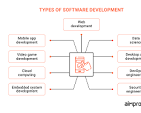Mastering the Art of Java Backend Development: A Guide for Aspiring Developers
The Role of a Java Backend Developer
Java backend developers play a crucial role in the development of web applications and software systems. They are responsible for creating the server-side logic that powers the functionality of an application, ensuring seamless communication between the front-end and the database.
Skills Required
To excel as a Java backend developer, one must have a strong understanding of Java programming language along with proficiency in frameworks such as Spring, Hibernate, or Apache Struts. Knowledge of database management systems like MySQL or Oracle is also essential.
Responsibilities
A Java backend developer is tasked with:
- Designing and developing scalable backend systems
- Creating APIs for seamless integration with front-end applications
- Optimizing application performance and troubleshooting issues
- Collaborating with front-end developers, designers, and project managers
- Maintaining code quality through testing and code reviews
Career Outlook
The demand for skilled Java backend developers continues to grow as more businesses rely on web-based applications to streamline their operations. With opportunities in various industries ranging from finance to e-commerce, a career as a Java backend developer offers stability and room for growth.
Conclusion
In conclusion, Java backend developers are instrumental in building robust and efficient web applications. Their expertise in server-side programming and database management ensures that applications run smoothly and securely. As technology advances, the role of Java backend developers remains pivotal in shaping the digital landscape.
Top 7 FAQs About Becoming a Java Backend Developer
- What is Java backend developer do?
- What a Java backend developer should know?
- Is learning Java backend worth it?
- What is a Java backend developer?
- What is the salary of a Java backend developer?
- How much do Java backend developers make?
- What do I need to learn to become a Java backend developer?
What is Java backend developer do?
A Java backend developer is responsible for creating and maintaining the server-side logic of web applications and software systems. They design and develop scalable backend systems, create APIs for seamless communication between the front-end and database, optimize application performance, and collaborate with other team members to ensure the smooth functioning of the entire application. Java backend developers play a crucial role in ensuring that applications run efficiently, securely, and meet the requirements of users and businesses.
What a Java backend developer should know?
A Java backend developer should possess a strong command of the Java programming language and be proficient in popular frameworks like Spring, Hibernate, or Apache Struts. In addition, they should have a solid understanding of database management systems such as MySQL or Oracle to effectively interact with databases. Knowledge of creating and optimizing APIs for seamless communication between front-end and back-end systems is essential. Furthermore, Java backend developers should be skilled in troubleshooting and debugging to ensure the smooth functioning of applications. Continuous learning and staying updated on industry trends are also crucial for a Java backend developer to excel in their role.
Is learning Java backend worth it?
Many aspiring developers often wonder, “Is learning Java backend worth it?” The answer is a resounding yes. Java is a versatile and widely-used programming language in the backend development realm, known for its scalability, reliability, and security features. By mastering Java backend development, individuals open doors to a plethora of career opportunities in various industries. With the continuous demand for skilled Java backend developers in the job market, investing time and effort in learning Java can lead to a rewarding and fulfilling career path with ample room for growth and advancement.
What is a Java backend developer?
A Java backend developer is a professional with expertise in utilizing the Java programming language to create and maintain the server-side components of web applications and software systems. They are responsible for designing and implementing the logic that powers the functionality of an application, handling data processing, communication with databases, and ensuring seamless integration between the front-end interface and the backend infrastructure. Java backend developers play a crucial role in building scalable, efficient, and secure applications by leveraging their knowledge of Java frameworks, database management systems, and best practices in backend development.
What is the salary of a Java backend developer?
The salary of a Java backend developer can vary depending on factors such as experience, location, company size, and specific job responsibilities. On average, a Java backend developer in the United States can expect to earn a competitive salary ranging from $80,000 to $120,000 per year. However, highly skilled professionals with significant experience and expertise in specialized areas of backend development may command higher salaries, especially in tech hubs like Silicon Valley or New York City. It is important to note that salary ranges can fluctuate based on market demand and industry trends.
How much do Java backend developers make?
The salary range for Java backend developers can vary based on factors such as experience, location, and the specific industry they work in. On average, Java backend developers in the United States earn a competitive salary, with entry-level positions starting around $60,000 to $80,000 per year. As developers gain more experience and expertise in areas like system architecture and database management, their earning potential can increase significantly, with senior-level professionals often making upwards of $120,000 to $150,000 annually. Additionally, certifications and specialized skills in frameworks like Spring or Hibernate can also impact salary levels for Java backend developers.
What do I need to learn to become a Java backend developer?
To become a Java backend developer, aspiring individuals need to focus on mastering the Java programming language and its related frameworks such as Spring, Hibernate, or Apache Struts. Additionally, gaining proficiency in database management systems like MySQL or Oracle is crucial for handling data storage and retrieval efficiently. Understanding concepts like server-side logic, RESTful APIs, and object-oriented programming principles is essential for developing scalable backend systems. Continuous learning and practice in these areas will help individuals build a strong foundation to excel in the role of a Java backend developer.








